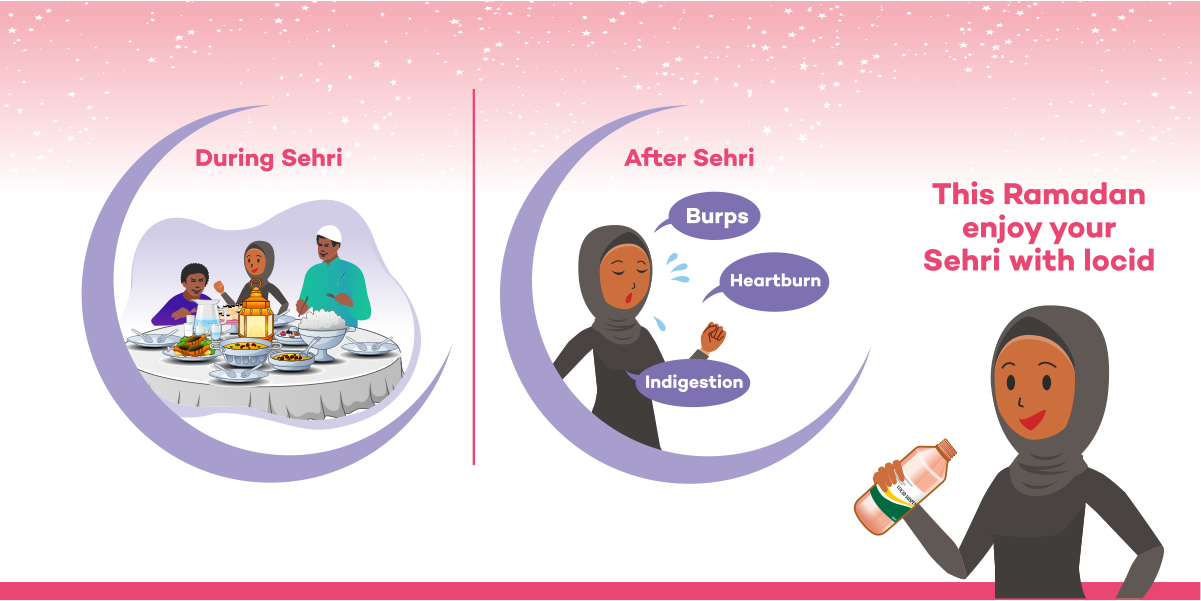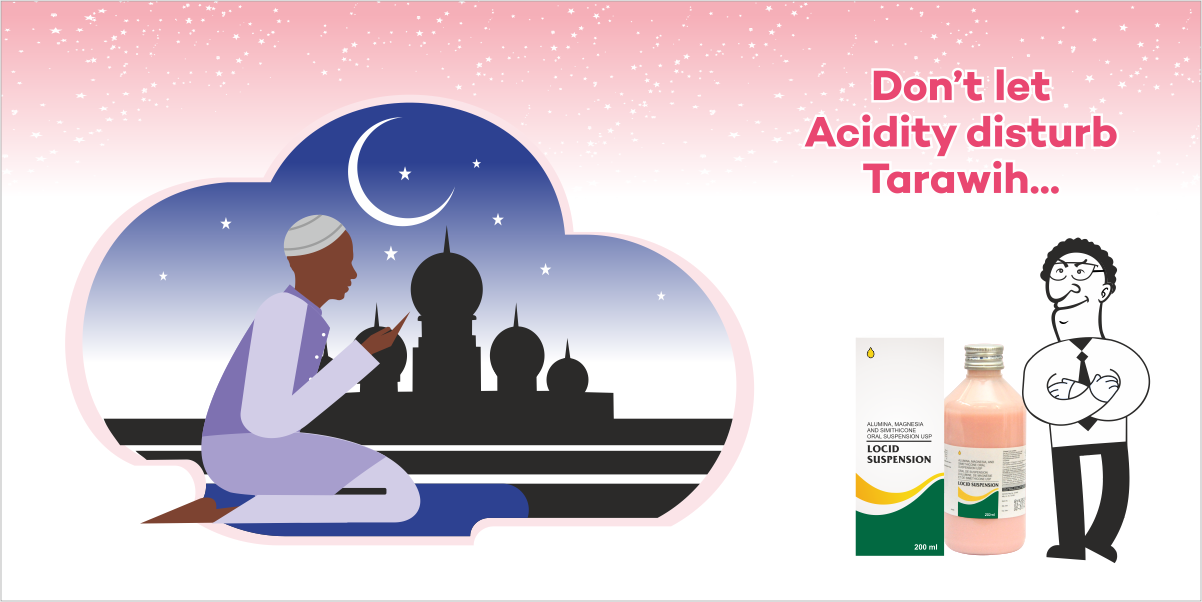During the holy month of Ramadan, millions of Muslims around the world observe fasting.
Generally, those suffering from gastritis and peptic ulcer disease (PUD) will have numerous questions about illness and religious obligations for Ramadan. Experience and existing literature indicate that fasting may lead to unwanted complications due to increased acid levels on an empty stomach. During the month of Ramadan, this can aggravate gastritis and PUD.
Hence, striking a balance between religious obligations and health is very important in this case.

Potential Health Complications and Remedies
Indigestion :
Fasting usually reduces the amount of acid, but the thought of food or its smell makes the stomach produce more acid. Thus heartburn could be a problem during the fast. Those who are on regular medication for indigestion such as antacids, antihistamines, or proton pump inhibitors are advised to continue taking them at Suhoor.
Heartburn or belching can be controlled by eating in moderation and avoiding oily, deep-fried or very spicy food. Reducing your caffeine intake and/or stopping smoking can also be of benefit, if relevant. Preparations such as peppermint oil may help reduce belching . Sleeping with your head raised on a few pillows and long-term weight loss may also help prevent heartburn.
Read More
Dehydration :
Dehydration is a common occurrence during a fast. The body continues to lose water and salts through breathing, sweat and urine; the quantity of water loss will vary depending on the weather, how much you had to drink before your fast, the degree of physical exertion and the ability of the kidneys to retain water and salts. Prevention is always better than cure. However, if you do not adequately rehydrate before a fast, your risk of dehydration is increased.
Depending on the severity of the dehydration, you may experience a general feeling of being unwell, lethargy, muscle cramps, dizziness, disorientation and even collapse or faint.
If you are unable to stand up due to dizziness, or you are disorientated, you should urgently rehydrate with regular, moderate quantities of water, ideally with sugar and salt.
If you faint due to dehydration, your legs should be raised above your head by others, and when you wake up, you should urgently rehydrate as outlined above.
Headache :
This is a common problem with many possible causes e.g. dehydration, hunger, inadequate rest etc. Consuming Suhoor with adequate fluids and, if necessary, taking a dose of painkillers such as paracetamol, may either prevent or reduce the risk of a severe headache. Headaches can also be prevented by sensible measures such as not exposing oneself to direct sunlight, wearing a hat when out, using sunglasses to reduce the effect of glare from the sun and relieving any tense muscles with a short, gentle massage.
Stress:
The sum of a lack of food and water, changes in routine and shorter sleeping time increases stress levels. Hence, it is important to address any potential sources of stress in order to minimise harm. This can be helped by not taking on more than you can reasonably handle, not playing sports in the hot sun, keeping anger in check and abstaining from smoking.
Obesity :
For the unwary, or less cautious, food consumed during Suhoor or Iftar may lead to some unintended weight gain. Obesity is an epidemic in the making with numerous complications.
Constipation :
This is often exacerbated by dehydration. Include fruit and vegetables in the diet, increase fiber intake, be active etc. If the problem persists, a short course of bulk laxatives may be prescribed.

Tips to keep you healthy during Ramadan:
Fasting during the Holy Month can get difficult, especially during the peak of summer. Follow these tips to ensure you have a healthy Ramadan…
Read More
Do not skip meals :
Avoid skipping meals, especially Suhoor. Eating slow carbs after waking up will give you lasting energy throughout the day. If you don’t have a large appetite early in the morning, a glass of milk, few nuts and dates are recommended. For those who eat heavier meals in the morning, wheat kaboos with hummus or chicken is ideal. Remember to drink at least two to three glasses of water before you begin fasting to avoid feeling dehydrated during fasting hours.
Go slow when you break your fast :
Dates, fruit juices or other dried fruits and soups are perfect for breaking your fast. Your meals must contain a good mix of carbs, proteins, fruits and vegetables.
Foods to be avoided :
Fasting can often increase gastric acidity levels in the stomach causing a burning sensation and heaviness in the stomach. High fibre foods can prevent this. It’s also important to avoid fried, very spicy, salty and sugary foods. Sweets can cause health problems like indigestion, heartburn, and weight gain and should be avoided especially on an empty stomach.
Consuming excess salty food makes your body retain water and causes bloating while spicy foods induce thirst. Sweets and sugary foods are fast burning and will only last for three to four hours. Incidentally these will turn into fat, increase cholesterol levels and make you gain weight.
What to drink :
Drinks with high caffeine content e.g. coffee, tea, chocolate, sodas and even decaffeinated teas and coffees should be avoided. Caffeine drains calcium from your system, which makes you feel less full all the time. Avoid drinking tea at Suhoor as tea increases salt excretion in the urine, which is needed for your body during fasting. The ideal beverage would be water, or if you’re feeling more dehydrated than usual, try adding a slice of lime, strawberries or even mint to your glass of water.
Work out (mild) :
Light physical activity is also recommended to keep your body supple and fit. During the summer, your body can also perceive the lack of water for hunger, and could cause you to ingest more than your body can handle. Ensure to drink plenty of water when breaking your fast.

Frequently Asked
Questions of RAMADAN
Can COVID 19 patient observe fasting?
No studies of fasting and risk of COVID-19 infection have been performed. Healthy people should be able to fast during this Ramadan as in previous years. COVID-19 patients should consult their doctors.
What should one eat during Ramadan?
Healthy diet, Proper nutrition and hydration are vital during the month of Ramadan. People should eat a variety of fresh and unprocessed foods every day and drink plenty of water.
Can I swim whilst fasting?
Yes, but avoid swallowing the water.
Can I have a blood test?
Yes, both finger prick and intravenous tests do not invalidate the fast.
Can I have a blood transfusion whilst fasting?
No, in this case you would be considered too unwell to fast.
Can I fast if I am on antibiotics?
If you are unwell and require antibiotics regularly throughout the day then you would be exempt from fasting, and should make up your fasts at a later date when well.
If the antibiotics are for e.g. acne you may fast and take your antibiotics either before Suhoor or after Iftar.
Do breastfeeding women have to fast?
No. Islamic law exempts women from fasting whilst breastfeeding and they can make up for it at a later date.
Can I take tablets, drops, injections or patches whilst fasting?
Tablets are not permitted during the fast. If you do take medications during the day, it is worth consulting with your doctor if your medication regime may be amended. Eye and ear drops are permissible. Vaginal pessaries and any form of skin patches e.g. nicotine, are permissible, rectal suppositories and nasal sprays are not allowed. Injections (IV, IM, SC, epidural) are all permissible provided they are not for nutritional benefit.
Can I fast whilst undergoing dialysis?
Such patients are not advised to fast during Ramadan or at a later date. Islamic law states they must give to charity instead, and should consult an Islamic scholar for further advice.
Do nose bleeds invalidate a fast?
No, and if this happens patients do not have to make up for any fasts. The fast can only become invalid if such a large amount of bleeding occurs and the patient swallows it.
Can I use mouthwash/ gargle?
Yes provided nothing is swallowed, it is advisable to rinse the mouth with water following use of these, and to avoid if possible.
Can I take immunisations and vaccines?
Yes, childhood immunisations and vaccines for travel do not invalidate a fast.
Can I use creams and ointments?
Yes, anything where the medication is absorbed through the skin is permissible.
Can I take medications to control menstrual cycle during Ramadan?
Yes. However, this should be discussed with your doctor, as depending on which pill you may get some breakthrough pill. It is also important to remember that Islamic law states that women should not fast when menstruating, and can make up for the fasts at a later date.
Can I fast if I suffer from Diabetes or other medical conditions?
The answer to this will vary on the severity of your condition. The safest option is to discuss your condition and medicine regime with your doctor who will be able to advise accordingly.



